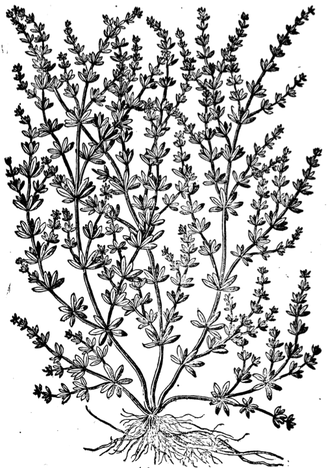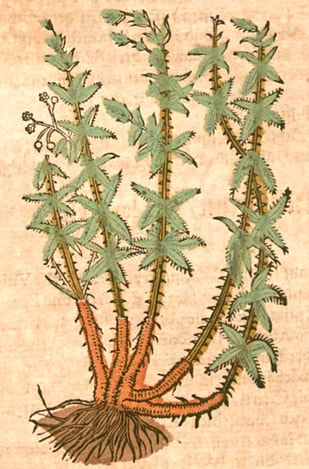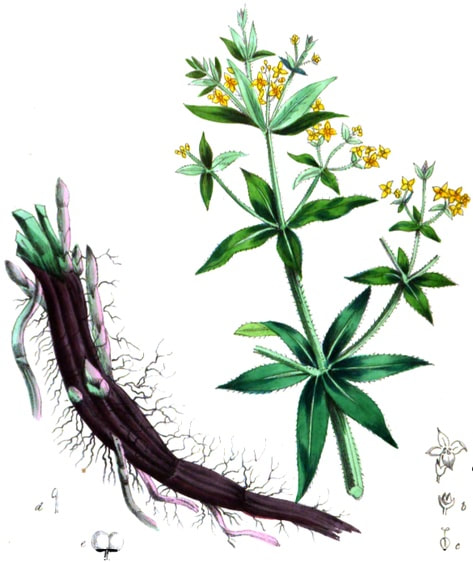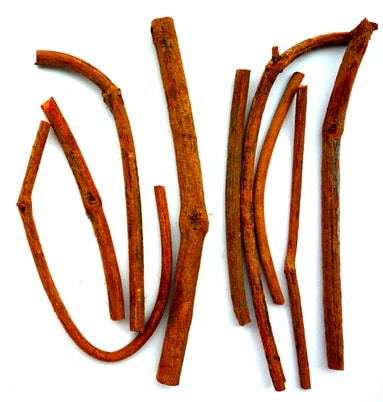|
New Kreuterbuch, Matthiolus, 1563
|
Krauterbuch, Lonitzer, 1578
|
An Encyclopaedia of useful and ornamental Plants, Burnett, 1852
Madder root as used in Tibetan Medicine (Adam, 2016)
Botanical name:
Rubia tinctorum
Garden (R. tinctorium) and Wild (R. sylvestris) were known
R. cordifolia (syn. R. manjistha) the Indian Madder, is used in TCM, Tibetan Medicine and Ayurveda. In some parts of China (Xinjiang) R. tinctorum is used as Qian Cao Gen, meaning that the two species are used synonymously.
Parts used:
Root
Temperature & Taste:
Cool (some held it warm), dry. Bitter, Sweet, Pungent
Classifications:
2A APERIENT. 2D ATTENUATERS OF CONGEALED BLOOD. 2F. PURIFYING. 2G. CLEANSING. 2P. HEMOSTATIC
3E. DIURETIC. 3F. LITHONTRIPTIC. 3G. EMMENAGOGUE
4f. SPLENETIC. 4h. NEPHRITIC. 4i. UTERINE. 4k. ARTHRITIC
Rubia tinctorum
Garden (R. tinctorium) and Wild (R. sylvestris) were known
R. cordifolia (syn. R. manjistha) the Indian Madder, is used in TCM, Tibetan Medicine and Ayurveda. In some parts of China (Xinjiang) R. tinctorum is used as Qian Cao Gen, meaning that the two species are used synonymously.
Parts used:
Root
Temperature & Taste:
Cool (some held it warm), dry. Bitter, Sweet, Pungent
Classifications:
2A APERIENT. 2D ATTENUATERS OF CONGEALED BLOOD. 2F. PURIFYING. 2G. CLEANSING. 2P. HEMOSTATIC
3E. DIURETIC. 3F. LITHONTRIPTIC. 3G. EMMENAGOGUE
4f. SPLENETIC. 4h. NEPHRITIC. 4i. UTERINE. 4k. ARTHRITIC
ADVERTISEMENT:
Uses:
1. Cools the Blood, Stops Bleeding (West, TCM, Ayurveda, Tibetan Medicine):
-Bleeding with heat, or when associated with Blood stasis
-functional Uterine Bleeding, Coughing or Vomiting blood, blood in the Stool;
-bleeding from excess heat (TCM).
2. Clears Heat, Moves the Blood, Opens Obstruction, Clears Stasis (West, TCM, Ayurveda, Tibet):
-swelling and hardness of the Spleen or Liver; Seed with Oxymel for swelling of the Spleen (Dioscorides)
-Jaundice and chronic Hepatitis
-Scrofula, Tumors and Cancer.
-Heart disease.
3. Clears Heat and Poison (West, Ayurveda, Tibet):
-Ayurveda says it is ‘the best blood purifier’
-Eczema, Psoriasis, Dermatitis, Vitiligo, Herpes, Leprosy, Acne and other obstinate skin diseases with burning and itching
-various Poisons and Venoms including Snake Bite.
4. Clears Damp, Promotes Urine, Clears Gravel and Stones (West, Ayurveda, Tibet):
-Edema, Fluid retention
-Gravel, and Stones (has been regarded as specific for Stones)
5. Clears Deficient Heat, Benefits the Bones:
-aid in the treatment of Rickets, Fractures, especially slow-healing Fractures (West, Ayurveda)
-chronic inflammations, Hectic Fever
-Arthritis, Rheumatoid Arthritis and Sciatica. Avicenna listed Sciatica when taken with Hydromel.
6. Clears Heat and Phlegm, Benefits the Throat, Stops Cough:
-traditionally in Ayurveda to Benefit the Throat and is used in Tonsillitis and Hoarseness, as well as Lung conditions.
-Chronic Bronchitis (TCM)
-Salmon listed it for Cough and Lung Ulcers.
7. Rasayana (Tonic to the 7 Body Tissues):
-Diabetes
-'Tonifies the Interior'. (Shen Nong Ban Cao)
8. Externally:
-external Injury and Trauma.
-a paste of the root and Honey is applied to Swellings and Inflammations.
-a paste of the root powder with honey is applied to skin conditions including Scabies, Tinea, Eczema, Psoriasis, Leucoderma, Pityriasis Versicolor, Pityriasis Alba, Freckles and other skin discolorations.
-"applied with vinegar to cure pityriasis alba". (Avicenna)
-"It also clears the skin and removes all kinds of spots and stains". (Avicenna)
-'creeping sores' (Lonicerus)
-a wash externally for Tubercular conditions of the skin or mucus membranes.
-Dioscorides used a cataplasm with vinegar for mild cases of Leprosy.
-in tooth powders for loose Teeth, painful and bleeding gums etc.
-in Collyriums for the eyes
-in India it is used in oils topically for Greying Hair.
-Dioscorides used a pessary to promote lochial discharge.
Dose:
Powder: 1–3 grams
Correctives:
... available in PRO version
Substitutes:
... available in PRO version
Preparation:
... available in PRO version
Comment:
This is a special medicine for the Blood; it can move the Blood to clear stasis; stop Bleeding from Heat, and clear Heat and Toxin from the Blood.
Powder: 1–3 grams
Correctives:
... available in PRO version
Substitutes:
... available in PRO version
Preparation:
... available in PRO version
Comment:
This is a special medicine for the Blood; it can move the Blood to clear stasis; stop Bleeding from Heat, and clear Heat and Toxin from the Blood.
Main Combinations:
Lacca & Madder
Madder & Rhubarb
1. Madder is commonly combined with ... available in PRO version
2. Madder is also commonly combined with ... available in PRO version
3. To open obstructions, for Fibroids, Liver swelling, Edema and Stones, Madder with ... available in PRO version
4. Menstrual obstruction and pain, Madder with ... available in PRO version
5. Uterus obstructions, Fibroids:
i. Madder with ... available in PRO version
ii. Madder with ... available in PRO version
6. Chlorosis, Madder with ... available in PRO version
7. Irregular Uterine Bleeding, Madder with ... available in PRO version
8. Chronic skin diseases including Leprosy, Madder with ... available in PRO version
9. Blood Stasis (in the Chest), Madder with ... available in PRO version
10. Jaundice:
i. Madder with ... available in PRO version
ii. Madder with ... available in PRO version
11. Dysentery, Madder with ... available in PRO version
12. Edema, Madder with ... available in PRO version
13. Trauma, Bruising, Madder with ... available in PRO version
14. Fractures, combine Madder with ... available in PRO version
Major Formulas:
Decoction for Jaundice
Emmenagogue Decoction (Riverius)
Emmenagogue Syrup
Syrup of Mugwort Lesser (Bononiense)
Powder of Madder
Powder of Gum Lacca Lesser of Rhasis (Dialacca Minor) (Rhasis)
Powder of Gum Lacca Lesser (Dialacca Minor) (Mesue)
Powder of Gum Lacca Greater (Dialacca Majores) (Mesue)
Powder to Promote Birth (Alexander)
Bruise Powder (Mesue)
Powder Against Bruising
Powder for Bruising Greater (Wirtzung)
Powder for Congealed Blood in the Chest
Powder for Edema (Wirtzung)
Troches of Gum Lacca (Trochisci de Lacca) (Mesue)
Electuary for Internal Bruising
Pills for Retention of Urine (Wirtzung)
Madder Pill (Tibetan Medicine)
Amomum 11 (Ko la 11) (Tibetan Medicine)
Chebula 10 (A Ru 10) (Tibetan Medicine)
Chebula 18 (A Ru 18) (Tibetan Medicine)
Sandalwood 18 (Tibetan Medicine)
Possessor of Ruby Color (Pad rag mdog ldan) (Tibetan Medicine)
ADVERTISEMENT:
Lacca & Madder
Madder & Rhubarb
1. Madder is commonly combined with ... available in PRO version
2. Madder is also commonly combined with ... available in PRO version
3. To open obstructions, for Fibroids, Liver swelling, Edema and Stones, Madder with ... available in PRO version
4. Menstrual obstruction and pain, Madder with ... available in PRO version
5. Uterus obstructions, Fibroids:
i. Madder with ... available in PRO version
ii. Madder with ... available in PRO version
6. Chlorosis, Madder with ... available in PRO version
7. Irregular Uterine Bleeding, Madder with ... available in PRO version
8. Chronic skin diseases including Leprosy, Madder with ... available in PRO version
9. Blood Stasis (in the Chest), Madder with ... available in PRO version
10. Jaundice:
i. Madder with ... available in PRO version
ii. Madder with ... available in PRO version
11. Dysentery, Madder with ... available in PRO version
12. Edema, Madder with ... available in PRO version
13. Trauma, Bruising, Madder with ... available in PRO version
14. Fractures, combine Madder with ... available in PRO version
Major Formulas:
Decoction for Jaundice
Emmenagogue Decoction (Riverius)
Emmenagogue Syrup
Syrup of Mugwort Lesser (Bononiense)
Powder of Madder
Powder of Gum Lacca Lesser of Rhasis (Dialacca Minor) (Rhasis)
Powder of Gum Lacca Lesser (Dialacca Minor) (Mesue)
Powder of Gum Lacca Greater (Dialacca Majores) (Mesue)
Powder to Promote Birth (Alexander)
Bruise Powder (Mesue)
Powder Against Bruising
Powder for Bruising Greater (Wirtzung)
Powder for Congealed Blood in the Chest
Powder for Edema (Wirtzung)
Troches of Gum Lacca (Trochisci de Lacca) (Mesue)
Electuary for Internal Bruising
Pills for Retention of Urine (Wirtzung)
Madder Pill (Tibetan Medicine)
Amomum 11 (Ko la 11) (Tibetan Medicine)
Chebula 10 (A Ru 10) (Tibetan Medicine)
Chebula 18 (A Ru 18) (Tibetan Medicine)
Sandalwood 18 (Tibetan Medicine)
Possessor of Ruby Color (Pad rag mdog ldan) (Tibetan Medicine)
ADVERTISEMENT:
Cautions:
1. Use carefully in Kidney inflammation
2. Not used in Cold and weak digestion in TCM.
3. It can aggravate Wind diseases
4. It tinges the Urine and even the Bones a red color
5. Toxic in large doses
Main Preparations used:
1. Use carefully in Kidney inflammation
2. Not used in Cold and weak digestion in TCM.
3. It can aggravate Wind diseases
4. It tinges the Urine and even the Bones a red color
5. Toxic in large doses
Main Preparations used:
History
|
'Madder is used in Hindu medicine as a colouring agent: medicated oils are boiled with Madder to give them colour. It is also a useful external astringent, and is applied to inflamed parts, ulcers, fractures, &c. Chakradatta recommends Madder rubbed with honey as an application to the brown spots of pityriasis versicolor. The Sanskrit name for Madder is Manjishtha. Under the names of Fuvvah and Runas, Arabic and Persian writers treat of Madder, probably the produce of R. tinctorium (as the roots which come from Afghanistan appear to be identical with those of the European species). They do not, however, make any distinction between the species, but simply mention a wild and a cultivated variety. The Mahometans consider the drug to be deobstruent and prescribe it in paralytic affections, jaundice, obstructions in the urinary passages and amenorrhoea. They mention the fruit as useful in hepatic obstruction, and a paste made from the roots with honey, as a good application to freckles and other discolorations of the skin. The whole plant is reputed to be alexipharmic; it is also hung up in houses to avert the evil eye, and tied to the necks of animals with the same object. Ainslie observes that
|
the hakims are in the habit of prescribing an infusion of Madder root as a grateful and deobstruent drink in cases of scanty lochial discharge after lying-in. (Materia Indica II., p.182.) In another notice of the article {Op. cit. I. p.202), he remarks that it would appear to be chiefly produced in Cuchar, and the root is in great demand in the adjacent countries, for dyeing their coarse cloths and stuffs red; the Nepalese are in the habit of bartering it for rock salt and borax. Kinnier and Tavernier notice the abundance of Madder in Persia and Makran. Dr. G. Playfair, in a note appended to his translation of the Talif-i-sharifi (p. 150), states that if taken to the extent of about 3 drachms several times daily, it powerfully affects the nervous system, inducing temporary delirium, &c, with evident determination to the uterine system. The plant is common on the higher ghauts in the Bombay Presidency, but the Bombay market draws its supplies chiefly from Khelat through Sind. The imported article fetches a higher price than that grown in India. (Vegetable Materia Medica of Western India, Dymock, 1885)
|







